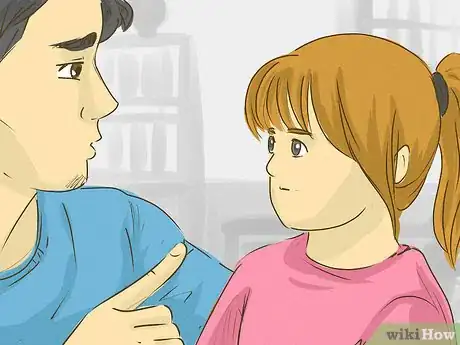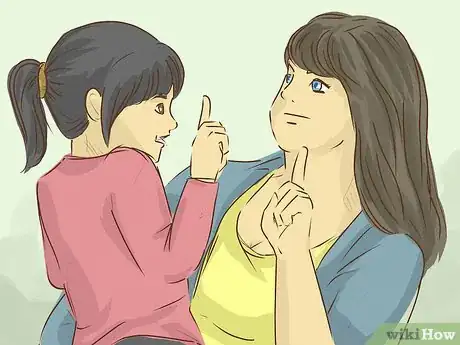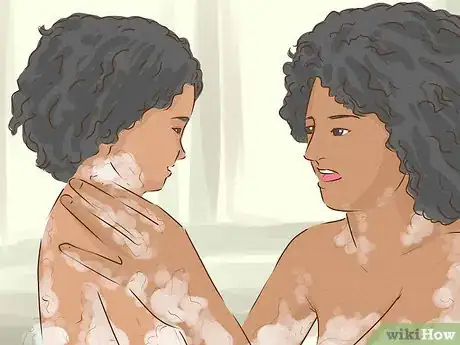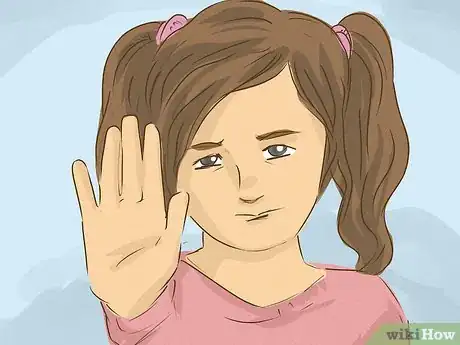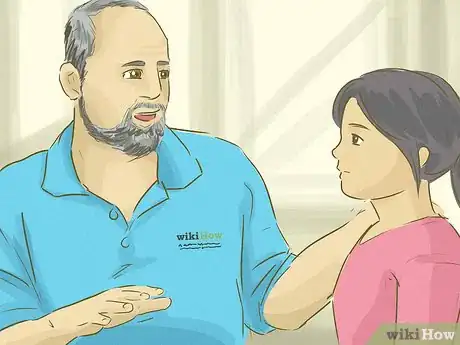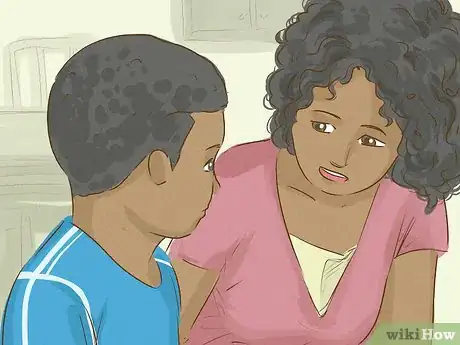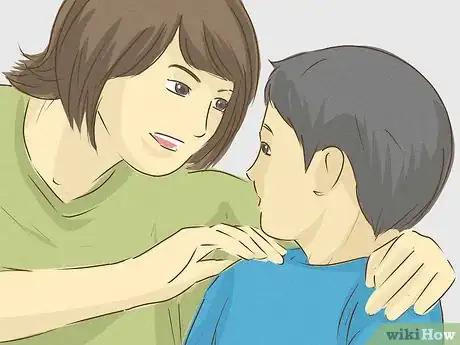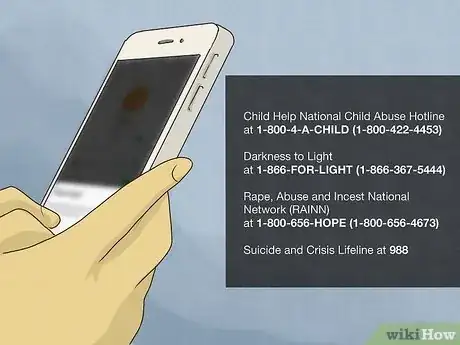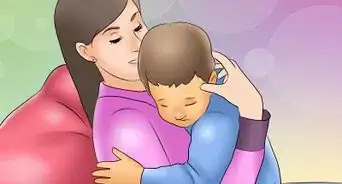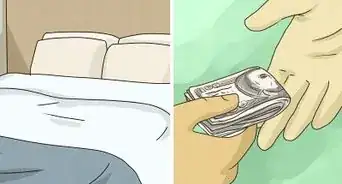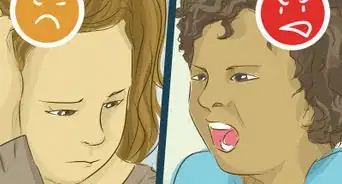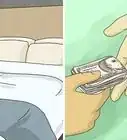This article was co-authored by Kirsten Thompson, MD. Dr. Kirsten Thompson is a Board Certified Psychiatrist, Clinical Instructor at UCLA, and the Founder of Remedy Psychiatry. She specializes in helping patients with mental health conditions such as major depressive disorder, anxiety, ADHD, bipolar disorder, OCD, PTSD, and postpartum depression. Dr. Thompson holds a BS in Operations Research Industrial Engineering from Cornell University and an MD from The State University of New York, Downstate College of Medicine.
There are 18 references cited in this article, which can be found at the bottom of the page.
This article has been viewed 37,733 times.
Sexual abuse is never a fun thing to talk about. Unfortunately, though, it’s common enough that your kids need to be able to recognize it and know what to do if it happens to them. Kids are less likely to become victims of sexual abuse if they’ve had a good sex education and feel comfortable talking with their parents, so address the issue directly instead of just hoping it never happens. First, consider how you want to approach the topic of sexual abuse with your kids. Then talk with them about how to recognize and respond to sexual abuse.
Steps
Approaching the Conversation
-
1Know the importance of discussing sexual abuse. You might feel awkward about discussing sexual issues with your kids, but these conversations could make a big difference in their future safety.[1] Learning about sexual abuse is an important aspect of your kids’ sex education, so think about how you can make the topic more comfortable for you and for them.[2]
- Don’t assume that learning about sex will ruin your children’s innocence or make them want to be sexually active. Age-appropriate education will actually help them recognize inappropriate behavior and make good decisions.
-
2Provide an age-appropriate explanation of sex. Before you can discuss sexual abuse, it may be a good idea to give your child a preliminary sex education lesson. This is essential so that you don't assume they know what you are discussing, and they don't. Kids learn quite a bit from other kids, so it's best to give them the right information early on.
- If you want to be the first to discuss sex with your children, start in early childhood. Keep the talk simple and age-appropriate. If asked "What is sex?" you might respond, "Sex is an act between two consenting adults."
- Let your children guide you about how much to share. If they still have questions, there's a chance you haven't explained the topic thoroughly.[3]
Advertisement -
3Start the conversation early. Start talking to your kids about which kinds of touch are okay and which aren’t okay when they’re three or four years old. Make sure they can recognize inappropriate touch by the time they start going to school or participating in other activities without you.[4]
- Talk to your kids frequently about healthy relationships and the kind of behavior they should expect from other people, like respect and consideration.[5]
- From there, explain that not everyone will treat them this way, and talk to them about some signs they should pay attention to, like feeling uncomfortable or belittled.[6]
-
4Make the conversation an ongoing one. As your kids get older, bring up the topic of sexual abuse in ways that pertain to their current level of development. The more often they hear the message, the better they will internalize it.[7]
- If you normalize talking about sex, your kids will be more likely to come forward and get help if anything ever does happen to them.
-
5Teach about body parts. Start educating with your children at a young age about their body parts. Teach them the proper names of their body parts. Children are like sponges, they absorb everything they are exposed to in their environment and will pick up inaccurate or inappropriate language and description of body parts. Additionally, by starting these conversations early on in life, and encouraging a comfortable open learning environment, you can help encourage your child to speak to you clearly if something inappropriate was to ever happen.
-
6Give them an opportunity to practice consent. It can be confusing to a younger child that certain touch is unsafe when parents or other family members touch them without asking. Create trust and consistency in your message about sexual abuse by establishing basic consent from your child.
- Teach your child that some body parts are private and are not meant for others to see.[8] Explain to them that no one should touch or ask to touch their private body parts. It is important for parents to be aware that many sexual predators will start by attempting to gain the trust of the child and then ask them to touch their private body parts, once that trust is gained. Therefore, it must be emphasized to your children starting at a young age that this is not okay.
- Teach your child that no one should be taking photos of their private body parts. Oftentimes, pedophiles will take pictures and share and sell them on the internet.
- You might ask your child during a bath, "Is it okay if I wash you there?" indicating their private parts.
-
7Help them understand their rights regarding their bodies. However, consent goes beyond touching to making sure your child understands that their entire body is their own.[9] Encourage from an early age that they ask permission from others before hugging, tickling, or kissing. Also, be sure that they understand they have the right to say "no" to touch as well.[10]
- You might emphasize this early on by having others ask the child if they want to be picked up. If the child shies away, then that's a clear message that they don't want to be touched.
- Never force your child to hug another child, no matter how cute it is. Let them know that they have a choice in who touches them and vice versa.
Explaining Sexual Abuse
-
1Teach kids about private parts. When your kids are still toddlers, explain to them that some parts of their body are only for them to see. Tell them that it’s okay for a parent to help keep their private parts clean or for a doctor to check that they are healthy, but that no one else should touch those parts of their body.[11]
- Bath time is a good opportunity to discuss private parts with toddlers.
- Explain that it’s okay to take off clothes around other people in a few situations, like changing in a locker room and using the urinal in the boys’ room.
-
2Distinguish between safe and unsafe touches. Talk with your kids about which kinds of touch are okay, and which are not. Give them real-world examples of each so they’ll be able to recognize inappropriate touch if it happens to them.[12]
- Avoid using vague terms such as “bad touch” and “hurt” to refer to sexual abuse. If the abuse isn’t painful, or if it even feels good, the victim may not realize that what’s happening is wrong.
- For instance, you could say, “A safe touch is like when you hug Grandma, or when you have a checkup at the doctor’s office. But if somebody who isn’t your doctor tries to touch you on your private parts, or in another way that makes you feel weird, that’s not a safe touch.”
-
3Teach your children that it’s okay to say “no.” Emphasize to your children that it is okay and very acceptable to tell ANY person “NO” if they feel uncomfortable or feel that things are just not right. Express to them that it is okay to tell an adult to leave if they feel uncomfortable or unsafe. Help them to identify helpful words or phrases to help them get out of these types of situations.
- Many children now have cell phones with them at younger and younger ages. Have your child work with you on identifying a code word that they will communicate to you if they are ever in an uncomfortable and/or unsafe situation.
-
4Teach your kids the correct names for their body parts. Instead of making up nicknames and euphemisms, just use the words “penis” and “vagina.” If your child is ever abused, knowing the correct terms will help them accurately describe what happened. [13]
- If you are really uncomfortable using the names of body parts, you can just say “privates,” which is unlikely to lead to confusion. However, this might make your kids feel uncomfortable using the correct names, too.
-
5Keep your discussion age-appropriate. If your kids are young, stick to simple explanations about what’s okay and what’s not. Be careful not to tell them anything that might confuse or scare them. As they get older, they will be able to handle more information about sex and abuse.[14]
- For instance, when your child is four, the most important issue is making sure they can recognize inappropriate touch. When they’re fourteen, though, it’s a good idea to talk about issues like consent and how to handle inappropriate crushes.
-
6Emphasize that anyone can be a predator. It’s important for kids to understand that even people they know and like can be abusers.[15] Make sure your kids know that any kind of sexual interaction between kids and adults is wrong, no matter who is involved.[16]
- For example, you could say, “If someone says inappropriate things to you or tries to touch you, it doesn’t matter who they are. Even if it’s someone you know, like your teacher or your baseball coach, it’s still not okay.”
-
7Talk about other inappropriate behaviors. Make sure your children are aware that other types of behaviors can be just as wrong as inappropriate touch. Examples include looking at a child while they’re undressed and exposing a child to sexual acts or pornography.[17]
- You don’t have to get too detailed when you talk about this, especially with young children. Say something like, “If an adult ever tries to make you look at their private parts, or says things to you that make you feel confused or scared, that’s not okay. If that happens, come and tell me or Dad right away.”
Helping Kids Stay Safe
-
1Tell your child about warning signs to look out for. Predators often groom children for weeks or months before starting to abuse them. Help your child learn to recognize red flags that could indicate danger.
- A few common grooming tactics include acting like a child’s friend, touching them in non-sexual ways such as tickling, giving the child drugs or alcohol, and encouraging the child to keep secrets from their parents.
- You could tell your child something like, “If an adult ever wants you to keep secrets from me and Mom, or if they want you to drink alcohol or break other rules, it’s really important for you to tell us about it.”
-
2Teach assertiveness. Tell your child that their body belongs to them, and that they can tell other people to stop touching them if they feel uncomfortable. Make sure your kids know how to say a firm “no” if someone violates their boundaries.[18]
- Help your child feel comfortable asserting their boundaries by backing them up, even in non-threatening situations. For instance, don’t make your child give people hugs if they don’t want to.
-
3Let them know they can always talk to you. Let your kids know that if someone does or says something inappropriate to them, they can tell you about it. Emphasize that you’ll believe them and that you won’t be mad at them.[19] [20]
- Say something like, “If someone touches you in a way that isn’t safe, it’s important that you tell me about it. I’ll always listen to you, and you won’t be in trouble.”
-
4Know how to get help for your child. If you are not sure where to turn to get help for your child, there are several resources available to you. You can call the:
- Child Help National Child Abuse Hotline at 1-800-4-A-CHILD (1-800-422-4453)[21]
- Darkness to Light at 1-866-FOR-LIGHT (1-866-367-5444). They provide children and adults with local information or resources about sexual abuse.[22]
- Rape, Abuse and Incest National Network (RAINN) at 1-800-656-HOPE (1-800-656-4673). They provide help to rape and incest victims, media, policymakers, and concerned individuals.[23]
- Suicide and Crisis Lifeline at 988. They provide help to families and concerned individuals.[24]
References
- ↑ Kirsten Thompson, MD. Board Certified Psychiatrist. Expert Interview. 18 August 2021.
- ↑ http://health.usnews.com/wellness/articles/2016-12-16/how-to-talk-to-your-children-about-consent-and-sexual-assault
- ↑ http://www.todaysparent.com/family/parenting/age-by-age-guide-to-talking-to-kids-about-sex/
- ↑ http://everydayfeminism.com/2014/02/10-ways-to-talk-to-your-kids-about-sexual-abuse/
- ↑ Kirsten Thompson, MD. Board Certified Psychiatrist. Expert Interview. 18 August 2021.
- ↑ Kirsten Thompson, MD. Board Certified Psychiatrist. Expert Interview. 18 August 2021.
- ↑ https://www.psychologytoday.com/blog/overcoming-child-abuse/201006/how-and-when-talk-your-child-about-sexual-abuse
- ↑ Kirsten Thompson, MD. Board Certified Psychiatrist. Expert Interview. 18 August 2021.
- ↑ Kirsten Thompson, MD. Board Certified Psychiatrist. Expert Interview. 18 August 2021.
- ↑ https://www.theatlantic.com/notes/2016/06/teaching-consent-to-kids-under-age-5/487358/
- ↑ https://childmind.org/article/10-ways-to-teach-your-child-the-skills-to-prevent-sexual-abuse/
- ↑ http://www.huffingtonpost.com/mary-l-pulido-phd/talking-to-your-child-about-sexual-abuse_b_3581232.html
- ↑ http://foreverymom.com/family-parenting/pediatrician-says-how-to-protect-your-child-from-sexual-abuse/
- ↑ https://www.ag.ndsu.edu/publications/kids-family/talking-to-children-about-sexual-abuse#section-3
- ↑ Kirsten Thompson, MD. Board Certified Psychiatrist. Expert Interview. 18 August 2021.
- ↑ https://www.care.com/c/stories/3445/7-tips-for-talking-to-kids-about-sexual-abuse/
- ↑ http://www.parentsprotect.co.uk/warning_signs.htm
- ↑ https://www.nsopw.gov/en-US/Education/TalkingChild?AspxAutoDetectCookieSupport=1
- ↑ Kirsten Thompson, MD. Board Certified Psychiatrist. Expert Interview. 18 August 2021.
- ↑ http://www.stopitnow.org/ohc-content/tip-sheet-8
- ↑ https://www.childhelp.org/hotline/
- ↑ http://www.d2l.org/
- ↑ https://www.rainn.org/
- ↑ https://988lifeline.org/
- ↑ Kirsten Thompson, MD. Board Certified Psychiatrist. Expert Interview. 18 August 2021.



